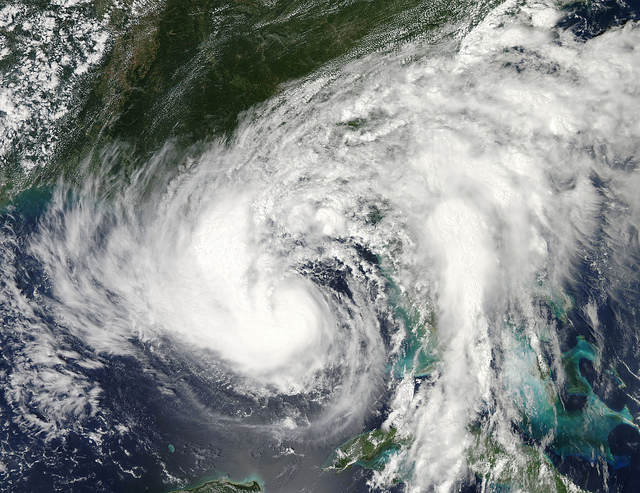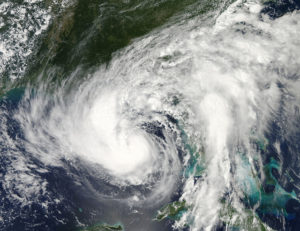Climate change used to be something that was going to happen to someone else, somewhere else, at some time in the future. But the back-to-back storms that have pummeled our coasts these past few weeks should convince all of us that we no longer have the luxury of thinking that way. Preventing even worse impacts should be among our top priorities.
Trump administration officials are saying that climate change is a “ longer discussion on another day ,” but we can’t put off this discussion until later. This isn’t just about one or even a handful of storms. It is about our future. If we don’t act urgently, we face years upon years of increasingly extreme storms; of rising seas flooding more homes along low-lying lands; and more and more disruptive heat waves.
The biggest uncertainty in how serious the impacts will be is us : how much global warming pollution will we choose to put into the air? How much will we allow our planet to heat up? That is an urgent question that we need to talk about now.
Make no mistake, the warmer we allow our planet to get, the more seriously our lives will be impacted. Hurricane Harvey dropped much more rain than it otherwise would have, because warmer air holds more water. The storm dropped so much water that the National Weather Service had to update their color charts to effectively display what had happened. The flooding was unprecedented; but the storm was part of a worrying trend. Since the 1950s, the most intense downpours in Houston have increased 167 percent . Harvey was the third “500-year” flood Houston has seen in the last three years.
Irma, too, was much worse because it happened in a warmer world. This storm generated maximum wind speeds of more than 180 miles per hour and sustained those winds for more than 37 hours, longer than any storm on record. Irma intensified over ocean waters that were as much as 2 degrees Fahrenheit warmer than normal
And because global warming is driving up sea level , the flooding threat posed by the storm surge from the hurricane was much worse than it otherwise would have been.
We can only hope that hurricane Maria – which i ntensified from a tropical storm to a Category 5 hurricane in one day – will stay further away from our coast.
We can’t stop hurricanes from forming. But we can take action now to put the brakes on global warming and prevent future storms like these from growing even more dangerous.
Here’s how. Climate scientists agree that to avoid the worst climate impacts, we need to stop burning virtually all fossil fuels and transition to clean, renewable energy by no later than 2050.
We’re already making real progress . Wind turbines and solar panels were novelties 10 years ago; today, they are everyday parts of America’s energy landscape. Energy-saving LED light bulbs cost $40 apiece as recently as 2010; today, they cost a few dollars at the local hardware store. America now produces nearly eight times as much renewable electricity from the sun and the wind as in 2007.
We can accomplish much more. Nationally, we have enough technical solar and wind energy potential to meet country’s energy needs more than 100 times over. And the American Council for an Energy Efficient Economy estimates that we can reduce our total energy consumption by 40 to 60 percent by the middle of the century, even as our economy continues to grow.
But to succeed, we need to ramp up our ambition now. North Carolina’s members of congress can start by standing up to attacks on laws that reduce pollution. In particular, we need to stop the Trump Administration from weakening emissions standards for cars and power plants . And North Carolina’s state and local leaders can and should do more to increase energy efficiency and accelerate the growth of clean power.
If anything good can come of these storms, perhaps it can be increased awareness of the role we are playing in making our weather more dangerous – and accelerated action to cut pollution and make our communities more resilient.
Morgan Folger is a Global Warming Associate with Environment America , the national affiliate for Environment North Carolina .


There are no comments
Add yours